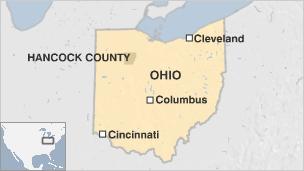Living Ohio man Donald Miller ruled 'legally dead'
- Published

A US man declared dead after he disappeared nearly three decades ago cannot now be declared officially alive, though he has returned home and is in good health, a judge has ruled.
Donald Miller of Ohio left behind a wife, two children and significant debt when he fled his home in 1986.
He was declared legally dead in 1994, then re-emerged in 2005 and attempted to apply for a driving licence.
A judge this week found death rulings cannot be overturned after three years.
Judge Allan Davis handed down the ruling in Hancock County, Ohio, probate court on Monday, calling it a "strange, strange situation", according to media reports.
"We've got the obvious here. A man sitting in the courtroom, he appears to be in good health,'' he said, finding that he was prevented by state law from declaring Mr Miller legally alive.
"I don't know where that leaves you, but you're still deceased as far as the law is concerned."
'Surprise'
Mr Miller, 61, testified that he fled his home in 1986 after he lost his job, leaving behind his wife, Robin, and two children.
By 1994, Mr Miller's back child support payments amounted to more than $25,000 (£15,646) and the family had heard no word from him.
With Mr Miller declared dead, his "widow" was entitled to Social Security death benefits to support their children.
As Mr Miller remains legally deceased, Ms Miller does not have to return those funds to the government.
It remains unclear if she would have been able to collect back child support had he been declared living.
Ms Miller's lawyer said his client was "satisfied" with the ruling on Thursday, and did not harbour ill will toward her ex-husband.
Mr Miller's "death" came as a surprise to him when he re-emerged in 2005. He was later told of the matter by his parents.
"It kind of went further than I ever expected it to," Mr Miller told the media. "I just kind of took off, ended up in different places."
Mr Miller has 30 days to appeal against the Ohio court's ruling, and may be able to challenge the US Social Security Administration in federal court, according to media reports.